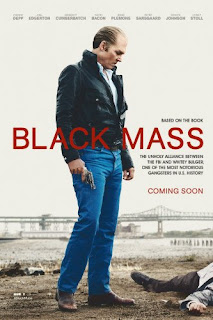Directed by:
Scott Cooper.
Starring:
Johnny Depp, Dakota Johnson, Benedict Cumberbatch, Kevin Bacon, Juno Temple, Corey
Stoll, Joel Edgerton and Peter Sarsgaard.
Running
time: 123 minutes.
Rated: ‘15’
for containing strong bloody violence and strong language.
Released in
UK cinemas from the 25th of November, 2015. Marking the penultimate screening in an annual visit to the London Film Festival, Black Mass appeared to be a feature that Oscar voters would practically salivate over: a lavishly designed period drama, set against a series of tragic factual events, replete with meticulous costume design, an ensemble cast to die for and of course, a lead actor in an overly attention-seizing role. Yet, despite the not-so-ingeniously calculated release date of Black Mass (November, a cinematic period in which undeniable Oscar bait is frantically unloaded onto cinemas), Scott Cooper’s admission into the Hollywood system is guilty of many transgressions, particularly the cheap imitation of a true American classic: Goodfellas. Nevertheless, 123 minutes after a concoction of endless brutality amongst truly unscrupulous characters, my blood had run cold. Black Mass had earned the title of 2015’s most frightening film, thus far.
Black Mass is in many ways, the product of an impressionable filmmaking team, who’s dedicated following of the sacred gangster sub-genre’s tropes are applaudable, yet somehow also frustrating, for Mark Mallouk and playwright Jez Butterworth’s screenplay is in actuality, a simplistic paint-by-numbers narrative which is liberated of painful mediocrity by one man: Johnny Depp. It isn’t often I admit that Depp is the greatest element of a particular film, but within Black Mass, the theatricality of Depp’s former performances is abandoned, in favour of a shockingly nuanced and career-revival turn which sent shivers down my very spine and is worthy of awards buzz. Depp’s appearance is in part, transformative, for the actor appears almost bald, accompanied by piercing blue eyes and facial prosthetics, culminating in a devilish cross between Bela Lugosi’s incarnation of Dracula, True Romance’s Vincenzo Coccotti (Christopher Walken) and Javier Bardem’s Anton Chigurh, of No Country for Old Men fame. But here, Depp’s portrayal of Whitey is concerned with believability, producing a methodically reserved performance relating to presence and speech – clearly a departure from Depp’s “larger than life” characters of yesteryear; a wicked character portrayed as a brooding introvert who despite first impressions, can be consumed by an unparalleled anger at the flick of a switch, resulting in malicious and horrifying acts, despite being a caring father and thoughtful presence in the neighbourhood, which Depp expertly handles throughout sombre and naturalistic moments, proving that he finally understands the phrase less is more, for his portrayal of Whitey is ultimately unpredictable, and captivating.
Despite being considerably overshadowed by Depp, the supporting cast attempt to rival Depp in relation to performances, particularly Joel Edgerton, who matches Depp in his extensive screen-time, but unfortunately not in regards to his acting abilities, delivering an almost comical and overly miscalculated performance, rather suited to that of a pantomime. Here, Edgerton seems completely out of place and better suited to earlier roles, such as Baz from 2010’s Animal Kingdom. Edgerton’s fellow cast members consist of a large roster of Britain’s and America’s finest on-screen talent. Yet, despite fine actors such as Cumberbatch, Juno Temple and Corey Stoll chewing on occasionally terrific dialogue, their roles are infinitesimal, to the point in which they appear for five minutes, then disappear (often killed). Adam Scott and Peter Sarsgaard are criminally underused, to the point in which Scott is only used for reaction shots (twirling an awesome moustache) and Sarsgaard portrays a coke-addled maniac, reduced to screaming and whining, whilst the many scenes belonging to the phenomenal Sienna Miller, were ultimately left upon the cutting room floor due to “narrative choices”. Once again, this is a clear example of an ensemble cast being used to create Oscar buzz, despite not suiting their roles, which is evident in relation to the poor Boston accents, in contrast to the similarly Boston-set and critically lauded film Spotlight from Thomas McCarthy, which also features fine American talent, yet is reserved in regards to accents, for fear of insulting audiences.
Verdict
Cooper’s beautifully lensed thriller may not strive to break the clichés which perpetually haunt the gangster sub-genre, yet Black Mass is an often exhilarating work of 70’s nostalgia, accentuated in its quality by a colourful yet underused supporting cast, despite this blood-soaked thriller predominantly serving as an acting showcase for the sensational Depp, in a chilling and commanding career-revival turn, whose greatest scenes are accompanied by an enthralling score from Junkie XL (as Tom Holkenborg). But as far as Bulger is concerned, Boston is his Wild West; a lawless town in which he is able to racketeer, kill and rule over in style. And for the most part, it’s thoroughly entertaining watching Depp at play, as he freakishly stares wide-eyed into the very windows of your soul. It’s just unfortunate that Black Mass is so conventional. Still, for a Depp-renaissance alone, it’s most certainly worth a viewing.
6 Stars out of 10
Written by Scott Gentry.
Film/TV Rating Key
1-2 stars out of ten = Awful.
3-4 stars out of ten = Average.
5-6 stars out of ten = Good.
7-8 stars out of ten = Excellent.
9-10 stars out of ten = Amazing.
Trailer
Clip





